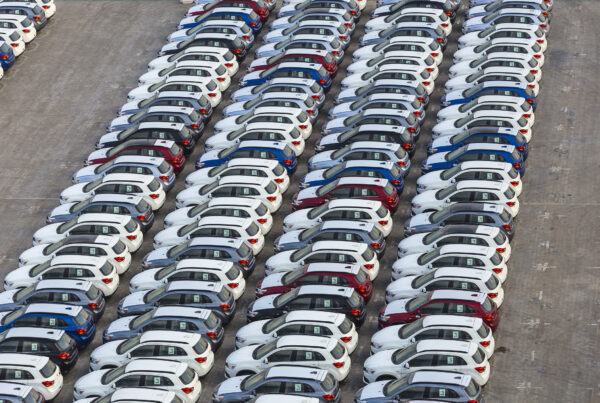This article was first published by DATAFORCE – Wir zählen Autos and is reposted with permission.
Despite difficult economic circumstances, Dataforce expects the passenger car market to grow in 2023. As production continues to ramp up, manufacturers will gradually work off the order backlog. Then again Dataforce expect little progress on electrification.
A shaky economic environment
For the past three years, the European passenger car market has been in a slump, with almost 30% fewer new cars registered in 2022 than the average for 2016-2019. At the same time, the economic conditions for 2023 are anything but supportive. Higher energy prices and the cost of living have dampened consumer sentiment, focussing the consumers’ interest on more immediate financial challenges than buying a car. Even companies, which have become an increasingly important group of buyers – about one in three new cars in Europe is a company car – are cutting their investments in the face of rising interest rates.
Large increases among car rental companies
Will the industry then have to brace itself for another weak year, or can the European car market finally recover in 2023? In percentage terms, Dataforce sees the greatest potential for growth this year among car rental companies. They have not recovered on 2020 fleet reductions so that rental cars have become scarce everywhere. Therefore, rental companies will seize the opportunity to replenish their fleets as demand from other channels softens.
More competition between manufacturers
On the other hand, manufacturer and dealer registrations will also increase again in 2023. This is due to improving availability of semiconductors and increasing competition, also from Chinese brands who are pushing into Europe. And so, the seller’s market is gradually becoming a buyer’s market again. Manufacturers will therefore sell more pre-registered vehicles, where it is easier to work with discounts.
Immense pent-up demand
However, before buyers can hope for more generous discounts again, the order backlog must first be processed. In the course of the last year, they have reached 2.5 times the usual level. And many potential buyers have not even ordered yet. Registration shortfalls over the last three years have accumulated to almost the amount of a full year’s volume. Thus, catch-up demand will also support the market this year. Companies have to renew their fleets regularly, since many vehicles make 30,000 km or more per year.
Taking all this into account, Dataforce and MSI forecast a volume of 12.7 million passenger cars for the total of the 30 European markets considered. This corresponds to an increase of 13 % compared to 2022. At the same time, the market is still 19 percent below the pre-crisis level.
Electrification is slowing down
By 2035, European countries want all new passenger cars to be locally emission-free. Compared to that, the share of electric vehicles was only 13.3% in 2022. In 2023, Dataforce forecasts only a gradual increase in the BEV share and a further decline in the PHEV share. Although many new models are once again providing a breath of fresh air and the charging infrastructure is slowly improving, there are also a couple of negative factors to consider. These include not only rising prices and falling purchase grants, but also the ramping up of combustion engine production that has not met demand in recent years.


















